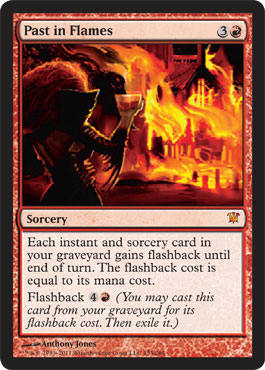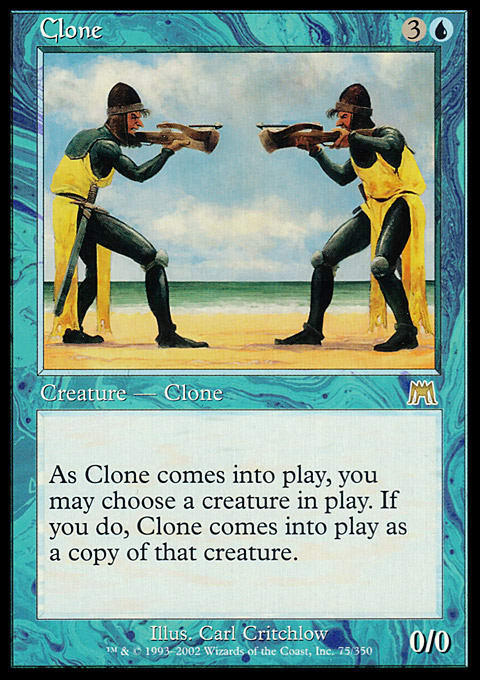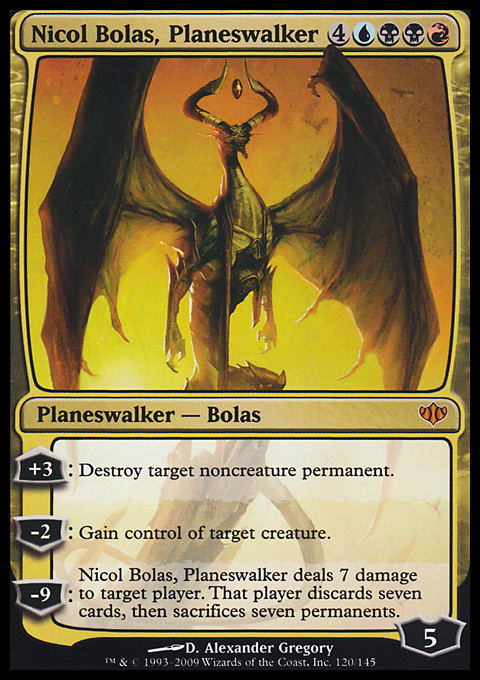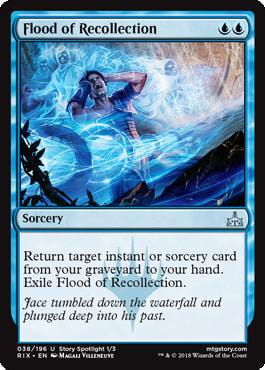Retcon. Retroactive Continuity. Establishing the past, in the future.
As we noted last time, Jace didn't have a past when he was introduced in the present of the storyline, nor were there any predictions for it. Doug Beyer kept his predictions for Jace to the present and the future:
Doug Beyer's prediction about Jace's future turned out to be a prediction about his past, though. That's the kind of weird paradox you get when you're writing retroactive continuity. That's the sense in which I'm using retcon today, by the way. We tend to use the term in fandom spaces now to mean a full scale, almost Orwellian, rewriting of the past, but the notion of creating continuity after it "should have happened" is perhaps closer to its original meaning. Flashbacks, prequels, that sort of thing -- that's all part of this understanding of retcon. And given that Jace has no past at the point where Beyer wrote that prediction, just a snapshot of a personality designed to sell the character and his (still unwritten) stories, practically anything said about his past is going to be, technically, retroactive continuity.
Of course, from a certain perspective, any information conveyed within a narrative in a nonlinear way might be thought of as a retcon. I mean obviously this stretches the term to the point of uselessness, but just go with it for a second here. The engine driving a literary experience from a Reader Response perspective is the constant interplay between a reader's map of what kind of story they're reading, and the text itself still yet to be read. Part of that inevitably is that some information about the scenario may be left out or even merely left in the reader's map as something unimportant, only revealed later to have many other connections. This new-old information prompts a mental rewriting of the text, a transformation of our sense of the continuity of the story.
And I'm not just screwing around associating the two things. That's literally what Wolfgang Iser suggests we're all trying to do as readers: establish a continuity for a story in which we can make sense of an imagined world. A text will, frequently, resist us in doing that in one way or another. It's wresting with the text that helps create that map/reassessment dynamic, and, for Iser, the thing that really characterizes the literary experience. A text that simply offers us exactly what we expect, that perfectly maps to our speculations, wouldn't have a lot of merit because it wouldn't challenge us in any way.
This should put retcons, if we're still running with this ultra-expanded definition of the term for the moment, in the Good Literary Device box, but the demon is in the details and also on Shandalar; Liliana backstory reveal 2K18 people, let's go! Reader Response Theory's just noting a broad mechanism that we can understand and use to analyze our experiences. It's not a reductive how-to model for writing. Literary criticism practically never is! And I'm not actually sure that in practice retroactive continuity -- revealing a backstory late within a story itself -- is all that good an idea!
One major issue that can arise is one of simple narrative clumsiness. Sure, starting your film in the middle and going back to fill in the backstory can be interesting, but it can also leave character motivations in a muddle, with no way to connect to the characters or action, which seem to come from nowhere. I'm a little leery of the idea that authors should "make us care" about characters, but I think it can, genuinely, be pretty hard to care about a character that, say, broods around hinting at a Dark Backstory without ever having a sense of what the heck that backstory is. Similarly, a twist that reframes motivations can be stunning and exciting, but it might also be disgruntling. If this continuity was so darn important to the character's whole arc, why didn't we learn what the heck it was earlier?
Still, when it works . . .
The great thing about the structure of Agents of Artifice in particular is that we don't actually need deep backstory to understand Kallist!Jace's motivations. He has a thing for Liliana. She's jerking him around. They both feel some loyalty to Jace!Kallist, but there's some unspecified falling out that makes them think he won't be glad to see them. But, they still feel motivated enough to warn him of impending danger. That's plenty to carry us through the early chapters . . .
. . . Right up until it turns out that Kallist was Jace, Jace was Kallist, and the specific danger they're all in was, in fact, a bunch of thugs hired by Liliana herself in order to get the two back together so their minds could be switched back. Whew.
So, there's a lot of flipped expectations here, for sure. This works for me, from a literary perspective, because it establishes these people as all supremely untrustworthy, and establishes Jace in particular as someone who can and will lie to himself to such an extreme that his whole reality gets subsumed by the lie, that his very identity can be rewritten by his own will to forget that he's lying to himself. Everyone in this book, and Jace especially, are driven by deception. Subterfuge. You know . . . artifice. Of which they're, what's the word, like, beholden to, driven by, taking orders from . . . employees!
Employees of Artifice.
Anyway, the result of this is that Beyer's dire predictions for Jace's future actually cascade into the past as well, until "those seeking to subvert and control his power" fill up his timeline from horizon to horizon. Oh there's Liliana, and Tezzeret, and Nicol Bolas, of course, and that's just the people manipulating Jace in Agents of Artifice. Tezzeret adopts Jace as a protege, then exploits the hell out of him as leader of the Infinite Consortium, torturing him when he fails to live up to Tezzeret's exacting standards. Liliana is using Jace as a bargaining chip, bargaining with Nicol Bolas to get his Infinite Consortium back in return for help with her demons. And Bolas . . . well.
We don't even necessarily know the extent of Nicol Bolas's manipulations. We now know (retroactively!) that Ugin, in order to protect himself from Bolas, placed a compulsive trigger in Jace's mind that would hurl him away across the Multiverse to Ixalan if anyone tried to dig too deep into his memories. Bolas met with Jace during the course of Agents of Artifice. In fact, he carried out an entire conversation with Tezzeret vocally while having a second conversation with Jace telepathically. This is the famous first moment after the Mending in which we get an Oldwalker's perspective on the changes, when Nicol Bolas proclaims to Jace that "We were gods once . . . We willed our desires on the worlds, and the worlds obeyed." What compulsions might he have slipped into Jace's mind while distracting him thus? Maybe something about a certain locked chamber created by his rival on a certain distant plane?
These questions make a lot of sense to ask about Jace because his arc, from Agents of Artifice on, has been characterized by unknown drives and the meddling of the powerful. Beyond the characters directly present in Agents, we also learn of Jace's former teacher on his home plane, Alhammarret, who hid Jace's planeswalking abilities from him, and whose mind Jace accidentally destroyed. There was more to that story, of course, as we -- and Jace -- learned later. And maybe not all of the details quite matchup. Ixalan's storyline suggests that Jace forgot most of what happened with Alhammarret, but Agents suggests he remembers a bit more of what happened, enough to drive his fear of his own power (power he ultimately employs to shatter Tezzeret's mind).
But . . . maybe that's ok. I mean, for goodness sake, Jace at one point describes how he knew on some level that the true Jace lost a toe to frostbite, but while he was convinced he was Kallist, this detail just sort of slid past him without registering as, you know, a break in his continuity. Part of Jace's nature is that he has the ability, on a very deep level, to breeze past contradictions or gaps in his own internal narrative, because he can always retcon his own damn brain to smooth things over.
What Ixalan's storyline makes clear is that continuity for Jace is deeply tied thematically to ideas about trauma. Jace keeps getting locked into a cycle of experiencing some traumatic invasion, exploitation, and betrayal that is then patched over through his telepathic defense mechanisms, burying anything too painful to look at directly, then doing the whole damn thing again. Jace's continuity for so long has been piecemeal, the fragmented reality that results from trauma's fissuring of meaning and experience. He is able to both assess the extent of Ugin's meddling and stand up to Azor only after he fully pins down his own traumatic continuity.
In this sense, weirdly, retcons are perfectly fitting for Jace Beleren's story. What other character could make such deep thematic use of the retcon as a narrative device, besides a telepath who constantly is having his brain meddled with, and constantly is meddling with his own brain on top of that? The masterstroke is simply taking that device -- telepath screws with his own memory -- and giving it thematic heft by tying the external storytelling techniques to the internal psychic world of trauma.
It's not a trick I think they're likely to be able to pull off much longer, mind -- the very fact that they're putting a marker in the storyline and saying this is Jace Putting His Traumatically Shattered Continuity Back Together means that it'd make thematic hash of the whole project to later on go oh, and by the way, Jace just remembered that ACTUALLY the way this REALLY happened was -- But I think it's worth giving up the ability to perpetually revise Jace's backstory, to keep noodling around with his possible pasts, in order to bring together these different levels of the story.
And that's perhaps the most interesting thing about Jace's continuity: these thematic levels were there as possible readings, certainly, but it would have been just as easy before Ixalan to read them merely as somewhat choppy handling of his continuity, the accidental result of the different forces pulling on Magic's storyline. Ixalan, by drawing these ideas to the surface and pulling the artistic levels together, exposes a thematic arc potentially present since Agents of Artifice was written a decade ago, and knits together meaning for the stories in between.
Just, you know . . . retroactively.




























